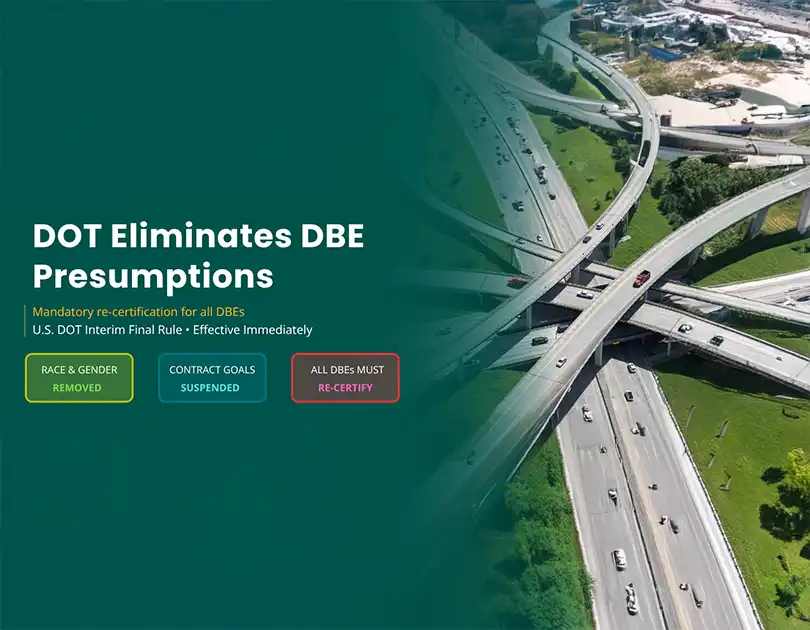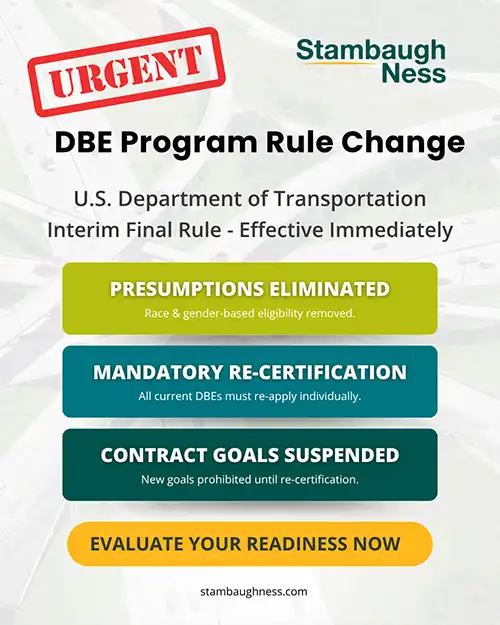Major Shift in the DBE Program: What Transportation Consultants Need to Know

The U.S. Department of Transportation (DOT) has issued an Interim Final Rule (IFR) that fundamentally alters the Disadvantaged Business Enterprise (DBE) program. Effective immediately upon publication in the Federal Register, the IFR removes the race- and gender-based presumptions of social and economic disadvantage that have underpinned the program for more than 40 years.
This action is a direct response to mounting constitutional challenges, including a pending federal case in Kentucky, where the court signaled that automatic presumptions of disadvantage may not withstand Fifth Amendment scrutiny. While a consent decree in that case is still pending, DOT has preemptively concluded that the presumption is unconstitutional and acted to overhaul the program without waiting for Congress or the courts to finalize the matter.
Key Elements of the Interim Final Rule
According to DOT’s signed IFR and accompanying guidance from the Office of Civil Rights:
- Re-certification Required: All currently certified DBEs will lose certification and must undergo reevaluation. Firms must submit personal narratives and documentation to establish individualized social and economic disadvantage.
- Burden of Proof on Firms: Applicants must now prove disadvantage; it will no longer be presumed.
- Suspension of DBE Goals: Federal funding recipients may not set DBE goals or count DBE participation until reevaluations are complete.
- Retention of Net Worth Cap: The Personal Net Worth (PNW) limitation remains in effect.
- Broader Changes: Updates also affect record-keeping, goal setting, and disparity studies.
DOT justifies the IFR by citing the unconstitutionality of the current presumption and the need for immediate action. At the same time, this move creates risk of a legal challenge under the Administrative Procedure Act (APA), since interim final rules typically require a more substantial showing of necessity than DOT may have demonstrated. This is further complicated by the current lapse in appropriations and government shutdown with the Office of the Federal Register publishing only documents “directly related to the performance of governmental functions necessary to address imminent threats to the safety of human life or protection of property and may publish documents related to funded programs if delaying publication until the end of the appropriations lapse would prevent or significantly damage the execution of funded functions at the agency… unless the document was received and scheduled for publication before the appropriations lapse began.” It’s not clear whether the IFR meets those standards. Regardless, it appears that the 30-day comment period is open, and the rule has already taken effect.
What This Means for Agencies and Consultants
For state DOTs and local agencies, DBE goals cannot be enforced until recertifications are complete. While existing contracts appear to be unaffected, agencies will likely need to revise their procurement practices and DBE participation goals promptly.
For transportation consultants and contractors, the environment shifts immediately:
- DBE firms face an urgent recertification burden.
- Non-DBE firms will soon see increased competition for federally funded work as set-aside protections fall away.
- The entire industry should expect increased scrutiny around eligibility, reporting, and compliance.
These developments parallel the SBA 8(a) program changes, where individualized disadvantage determinations replaced broad presumptions in response to constitutional challenges.
Handle Your Next Audit with Confidence
Access the on-demand recording of our 90-minute webinar with Government Contracting expert Robert Jones. You’ll get a step-by-step playbook to build a compliant indirect cost rate and prepare for a smooth audit.
We Saw This Coming
We previously noted that the DOT might act before the courts or Congress to address the constitutional risks. That prediction has now materialized. The IFR is DOT’s attempt to get ahead of the courts, but the future of the program remains uncertain. If the IFR is challenged under the APA, implementation could be delayed or overturned.
For now, however, firms must operate as though this is the new standard: individualized proof, re-certification, and heightened compliance obligations.
A Defining Moment in Federal & State Procurement
The DBE program has shaped the AEC transportation sector for over four decades. Its overhaul represents more than an administrative change—it is a defining moment in the intersection of affirmative action, equal protection, and public procurement. The industry must adjust rapidly while courts, Congress, and agencies wrestle with what comes next.
We are actively engaged through AASHTO’s Committee on Civil Rights and ACEC’s Federal Agencies and Procurement Advocacy Committee, ensuring we maintain close communication with the DOT, FHWA, and other key stakeholders. We will continue to share updates as the situation evolves.
How to Prepare Your Firm for What’s Next
Even with uncertainty around legal challenges, one fact is apparent: competition is opening up. Firms that relied on DBE set-aside protections will face a new reality, while those that never qualified will gain broader access to opportunities.
To compete effectively in this new environment, your organization must be audit-ready and compliance-strong:
- Bullet-proof accounting system compliance (SF 1408, FAR readiness).
- Documented, up-to-date policies and procedures (AASHTO ICQ, GAAP compliance).
- Solid indirect rate calculations and strategies to remain competitive and profitable.
- Readiness for state and federal audits as agencies recalibrate oversight.
Final Thought: Urgency Without Panic
This is not the time to wait and see. Whether or not the IFR survives legal scrutiny, agencies and firms are already moving to comply. Now is the time to take proactive steps to prepare your business for more open competition and heightened oversight.
Our GovCon Advisory team at Stambaugh Ness can help you navigate these changes with confidence. From accounting system reviews to indirect rate strategy, we position you to thrive in this evolving procurement environment.
If your organization has not already evaluated its readiness for a post-DBE landscape, now is the time to do so. Contact us to ensure your systems, policies, and rates are audit-ready and competitive in an environment where success will depend on merit, compliance, and performance.
Lead Your Firm Through the DBE Transition
The recent DBE program changes require more than just compliance—they demand a new strategy. This webinar is designed for C-level leaders to address this shift head-on. Join us to learn actionable strategies to protect your firm, diversify opportunities, and lead your team with confidence.




